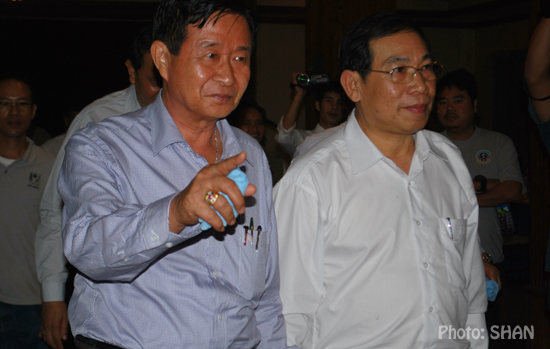As the first anniversary of President Thein Sein’s call for peace talks draws near, most non-Burman armed movements that either have concluded ceasefire agreements of are still negotiating say they are getting one step closer now though there is still “an awful lot” to be done.

Many points of the previous agreements signed still need to be implemented, before new ones could be negotiated and signed, according to a conclusion made at a recent meeting on the Thai-Burmese border.
On the bright side, 7 of the 12 ceasefire groups have set up liaison offices in government-controlled cities and towns:
Arakan Liberation Party (ALP) 2
Chin National Front (CNF) 2
Karen National Union (KNU) 3
Karenni National Progressive Party 3
New Mon State Party (NMSP) 8
Restoration Council of Shan State (RCSS/SSA) 6
Shan State Progress Party (SSPP/SSA) 2
Several groups also spoke of public consultations that they have been conducting, out of which have emerged volunteers for the Peace Monitoring Program, expected to be launched soon. (U Aung Min, Vice Chairman of the Union Peacemaking Work Committee, disclosed that regulations for Peace Monitors were still being drafted. He did not say when it will be finished.)
The groups have also been able to meet among themselves to discuss and agree upon a 7 point platform calling for :
• Talks outside each side’s “sphere of influence”
• An international body of observers
• Negotiations with all armed movements, both ceasefire and non-ceasefire
• A convention among ethnic movements, both armed and non-armed
• A broad-based national convention made up delegates from the ethnic forces, democratic forces and
the government
• Discussions reached at the said national convention to be implemented by all concerned
• Completion of the process “before the general elections in 2015”
U Aung Min, speaking at a press conference on 7 July, also reiterated Naypyitaw’s 3 step roadmap. Ceasefire, political dialogue and Panglong-like Conference before 2015.
On the other hand, all still bemoan the fact that there is still fighting between the Burma Army and the ethnic armies all of whom have signed ceasefire agreements, particularly the Kachin Independence Organization (1994), RCSS (2011) and SSPP (2012). “As long as fighting goes on, suspicions will continue,” said a participant, “which will pose as a stumbling block to a successful political dialogue.”
U Aung Min, Naypyitaw’s key negotiator, also appears to be aware of the fact. “Please inform Chairman Yawdserk (of RCSS) that I really feel embarrassed about the situation,” he told a Shan representative recently.
“We have reached several agreements, but only a scant of them has been implemented.”
President Thein Sein made a verbal invitation on 17 August 2011 for peace talks. The written invitation came out from the Presidential Office the next day.


